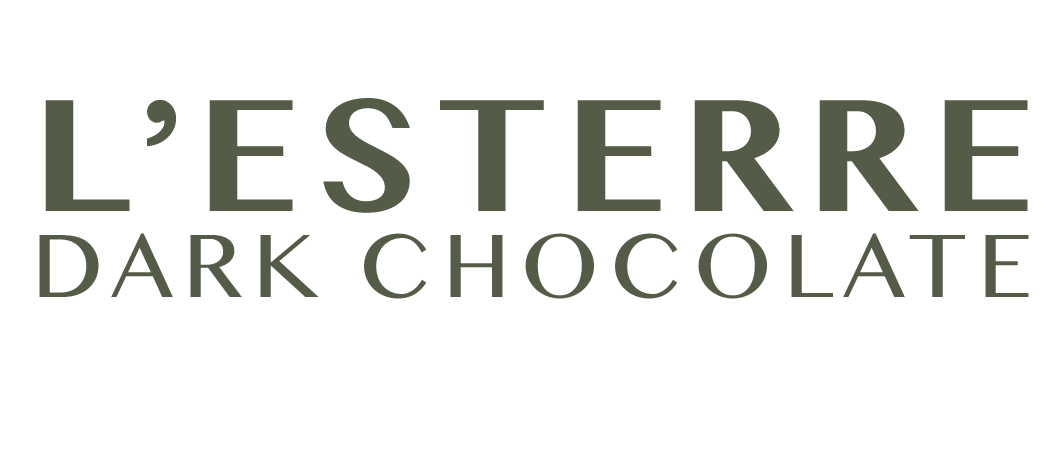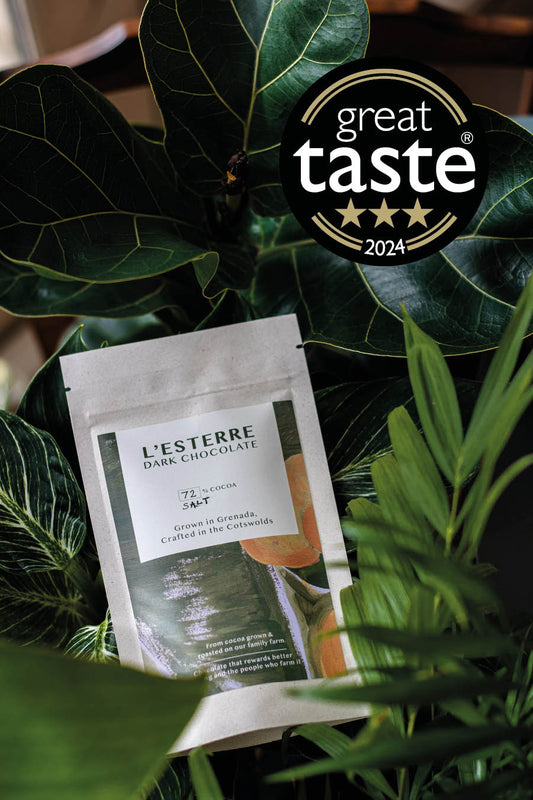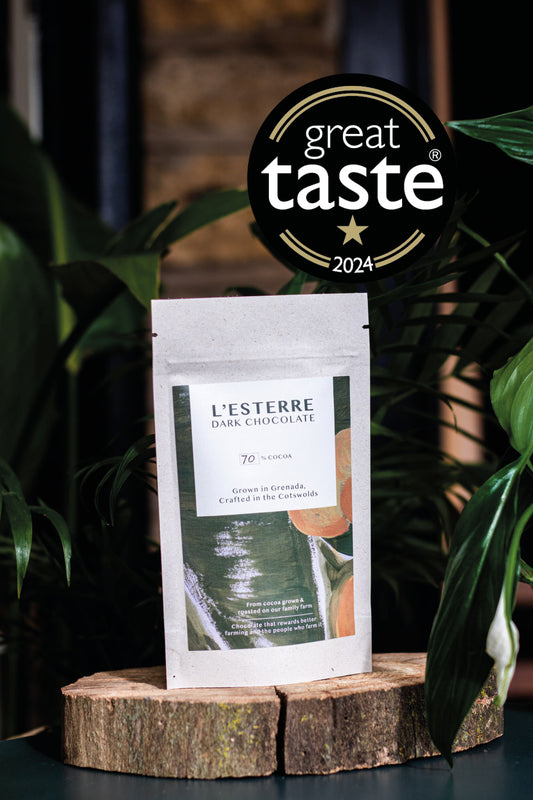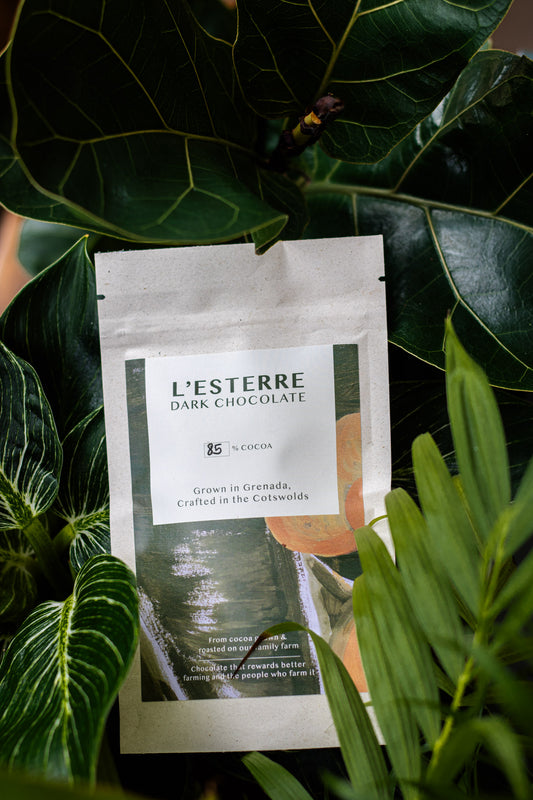
spice in your everyday
Nowadays, we are all more conscious about where our fresh produce comes from but admittedly most of us probably give a lot less thought to the origin of the spices we buy for our store-cupboard. For good reason, as it has to do with the fact that we don’t buy spices as often as we would do fruits and vegetables - also because they can last for years in our kitchen cupboards. Yet a little spice on a single meal goes a long way: freshly grated nutmeg can elevate any creamy dish, a dash of cinnamon on your morning porridge brings character and warmth. Slowly simmered dishes such as dahls, curries and tagines are transformed through the use of dried spices. They are transformative. To me, they are as essential to everyday cooking as oil and salt.

nutmeg in grenada
Growing nutmeg in Grenada is a match made in heaven, though it has only been growing in Grenada for just over one-hundred years ago. Cocoa, cotton, coffee and sugar were the main commodities grown on the island prior to this. As the sugar industry declined, nutmeg was introduced as a replacement. It quickly thrived and by 1918, Grenada produced 33% of the world’s nutmeg exports. By 1975 it was the economy’s number one industry.
Although during this time, even though nutmeg made up half of Gross Domestic exports, when you break down the numbers, it starts to tell a different story. Between the mid sixties towards late seventies, the wealth created from the Grenada nutmeg industry fell largely in the hands of the developed market economy.
In total, $66.3 million was paid to the farmers, whilst a whopping $1022 million was enjoyed by developed world through income, employment, profit and interest. All generated from Grenadian growers’ nutmegs. For every nutmeg purchased, the farmer’s share was 6%. The farmer’s nutmegs were bought for $1.28/lb with the final retail price totalling $22.86/lb.
Without going into the particulars, many middlemen are involved in the process: agents, governments, associations, all of whom add their mark up - sort of like pass the parcel, except every step of the way, more wrapping paper with a bigger price tag is added. Yet the true value of the nutmeg itself is down to the farmer who, as the most knowledgeable, knows when to pick the nutmeg at its best and process it to be sold at high quality. Sadly, similar stories like this occur the world over. Grenada can count itself lucky in many ways though - huge social and economic injustice still occurs within the global spice industry, with many large spice companies looking to prioritise quantity over quality for larger profits.

how to navigate honesty & quality in the spice world
It can be overwhelming when we think just how many food products we buy today can be mass produced, low quality and toiled in unjust supply chains, patching over slavery allegations that fall under the radar. This happens when companies become too big and cannot monitor their supply chain properly as too many players are involved. Luckily for us, the good guys are out there - and they’re growing in numbers.
They believe in not only quality, but fairness in the supply chain and opt to go direct to the source and cut out middle men, translating into a fairer price for the farmer and the end consumer. So think ahead and skip the supermarket spices. Choose spices through an honest, traceable source where you can learn the story behind the spice, the farmer, and most importantly its quality.
Below is a comprehensive list of online spice retailers from around the world with social justice and quality central to everything they do:
Rooted Spices (UK)
Well-travelled school friends Clara and Rachel co-founded Rooted Spices on the desire to offer vibrant, fresh, quality single origin spices as opposed to the lacklustre spices available on supermarket shelves that originated from multiple countries.
As well as a number of stand alone spices, they offer spice blends such as Daal, Golden and House blends - a bestseller dubbed ‘The Third Table Spice’. A personal favourite is their ground cumin - its texture, aroma, appearance and taste quite frankly makes its supermarket alternative taste dead in comparison.
Burlap & Barrel (US)
Ethan and Ori, a chef and social entrepreneur, who previously founded Guerilla Ice Cream in New York, came together again with the vision to cultivate social justice in the food system. They founded Burlap & Barrel, sourcing spices around the world that are grown biodynamically and organically, working with small holder farmers to move them up the value chain and into the spotlight of high-value markets.
Spice Trekkers (Canada & US)
A family-owned company based in Montreal. They directly source from producers who value quality and honour tradition. Flavour and cooking is at the heart of what they believe and their spices on offer is evidence of that.
Epices Roellinger (France, WW)
By far the most considered selection of spices and spice blends I have ever set eyes on. A family-owned company, the master mind behind it - Oliver Roellinger, a well-respected chef, known throughout the global industry. Use of spices became an integral part of his food, not only to punctuate his cuisine but as a means of narrating the story of his home, Brittany. Epices Roellinger, based in Cancale is spearheaded by his daughter Mathilde, who sources quality spices from around the world (including our nutmeg). A personal favourite - Poudre des Bulgares - a spiced saffron sugar with sesame and rose petal. Perfect on your morning yoghurt or porridge. It elevates any sweet, warming dishes (even bran flakes!)
1001 Organic (Zanzibar, WW)
Based in Zanzibar, the source of all their organic premium spices. 1001 Organic is a social enterprise that champions transparency and traceability in the supply chain. Their local farmer co-operative grows in a way that preserves nature and protects the environment, maximising positive social impact. Every spice product you buy has a Farmer-ID on its label so you can find out which community you are supporting with your purchase.
Certainly some food for thought. Ultimately, we as the consumer can vote with our buying power. Small changes more often that not make the biggest impacts. How important are spices in your every day cooking? Could you buy them online or small retailers instead of in supermarkets with big-name brands? Follow us on Instagram: @thesustenancecollective for more recipes, recommendations and tips for earth-friendly living.
Love Bobbie x



